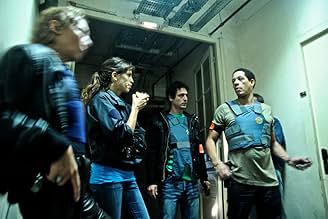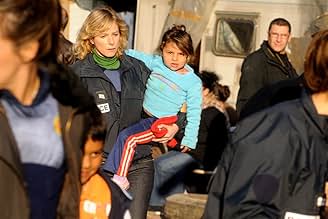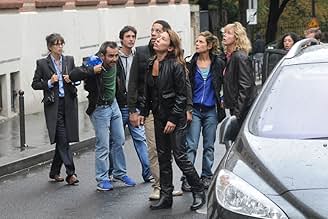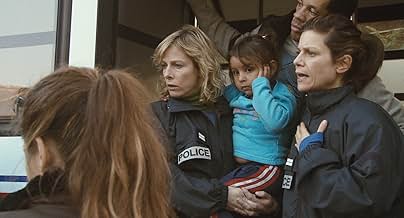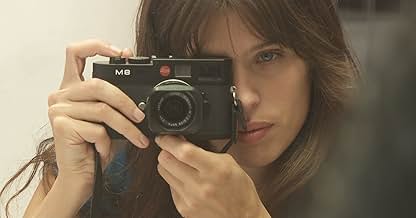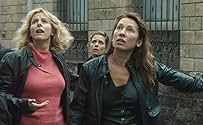IMDb-BEWERTUNG
7,3/10
15.983
IHRE BEWERTUNG
Eine Journalistin, die über die einer Jugendabteilung zugeordnete Polizei berichtet, geht eine Affäre mit einem ihrer Schützlinge ein.Eine Journalistin, die über die einer Jugendabteilung zugeordnete Polizei berichtet, geht eine Affäre mit einem ihrer Schützlinge ein.Eine Journalistin, die über die einer Jugendabteilung zugeordnete Polizei berichtet, geht eine Affäre mit einem ihrer Schützlinge ein.
- Auszeichnungen
- 7 Gewinne & 22 Nominierungen insgesamt
Frédéric Pierrot
- Baloo
- (as Frederic Pierrot)
Empfohlene Bewertungen
Polisse is a difficult film to define. Based on real-life cases dealt with by the Child Protection Unit covering the 19th arrondissement (borough or quarter) of Paris, it could possibly be called a docudrama, although it does not cover events of historical significance.
Maïwenn, who wrote, directed and featured in the film as a photojournalist shadowing the unit, spent time herself with such a unit for research. All the cases featured in the film are supposed to have taken place while she was there or were recounted to her at that time. It is this that gives the film its lifelike, gritty quality. Indeed, the first scene plunges straight into an interview with a little girl who claims her father is molesting her, and is swiftly followed by other similar interviews with suspected paedophiles, victims and accusers. Despite the obviously very serious subject of the film, humorous moments pepper the script, which successfully highlights the tragicomic ludicrousness of some of the situations they encounter.
Alongside the cases of child molesting and underage rape that the team deals with on a day- to-day basis, the film delves into the complex personalities of the characters, who are at times tender and patient, and at others frustrated, angry and even violent. We are privy to the emotional strain the job has on these police officers and the effects on their personal lives, their marriages and relationships with their children. Special bonds also develop between them, and their intimacy and affinity is so well portrayed that it is easy to forget that this is in fact a film and not simply a documentary.
Though Polisse, like real life, does not really follow a plot line, and we never find out if the criminals are actually brought to justice, one does not become bored or frustrated or ever wonder where the film is going. In fact, just like the TV series The Wire to which it has been compared, it is the lack of obvious direction of the film that ultimately makes it all the more powerful and effective.
Maïwenn, who wrote, directed and featured in the film as a photojournalist shadowing the unit, spent time herself with such a unit for research. All the cases featured in the film are supposed to have taken place while she was there or were recounted to her at that time. It is this that gives the film its lifelike, gritty quality. Indeed, the first scene plunges straight into an interview with a little girl who claims her father is molesting her, and is swiftly followed by other similar interviews with suspected paedophiles, victims and accusers. Despite the obviously very serious subject of the film, humorous moments pepper the script, which successfully highlights the tragicomic ludicrousness of some of the situations they encounter.
Alongside the cases of child molesting and underage rape that the team deals with on a day- to-day basis, the film delves into the complex personalities of the characters, who are at times tender and patient, and at others frustrated, angry and even violent. We are privy to the emotional strain the job has on these police officers and the effects on their personal lives, their marriages and relationships with their children. Special bonds also develop between them, and their intimacy and affinity is so well portrayed that it is easy to forget that this is in fact a film and not simply a documentary.
Though Polisse, like real life, does not really follow a plot line, and we never find out if the criminals are actually brought to justice, one does not become bored or frustrated or ever wonder where the film is going. In fact, just like the TV series The Wire to which it has been compared, it is the lack of obvious direction of the film that ultimately makes it all the more powerful and effective.
An authentic gem. A real one. Not a thriller nor a crime movie. Actually, this amazing feature reminds me Xavier Beauvois' LE PETIT LIEUTENANT, released in 2005. The real picture, poignant, terrific life of the daily procedural life of cops. Here, it is the child protection squad; a bunch of men and women who fight against child molesters, people who sometimes rape their own children !!! Policemen and women who have to face the ugliness, the most disgusting side of the real life. In this film, you cry, laugh, feel your heart under pressure when watching this wonderful performance given by the actors, so close to reality. Yes, the characters, and not only the cops, look real ones. A powerful, vivid movie that may give you the feeling to be hit by an express train.
The ending is really awful, but I won't tell you more. Go and see this masterpiece. Now!!!
The ending is really awful, but I won't tell you more. Go and see this masterpiece. Now!!!
I had no idea that this film had many nominations at last year's César awards (the french Oscars). I started to see it on cable and immediately got interested in the subject and the way they handle it. It's straight forward but subtle at the same time. It has a good moving pace, there's always something going on. The array of characters is very rich and even though there's no time to get more deeply into their private worlds, you get to understand that they are mere human beings doing their best at their job, which is trying to protect all "minors" from abusive situations. I specially liked the realism of the characters, you end up caring for most of them and wishing them well in their actions.
7OJT
Polisse is a documentary style feature film, which follows French police working with child molestation and abuse. We're follow them in a film without a plot, only everyday life and troubles, and through dinners and bar escapades. The cases and the language is really rough stuff, and this is obviously not for everyone. If you're easily offended, keep away.
We're given no explanation, just follow what happens as a fly on the wall. So is the director here, Maiwenn, which uses a small tourist camera, taking pictures all the time. Strange, and looking quite unprofessional, but then she is originally an actor. We're looking at actors, but this is all based upon real life, we're told, at least.
We see some horrific cases of them unveiling child abuse of different kinds, and when they talk in their spare time, the language is very graphic. Maybe this is a work hazard, still I find it strange that these grown ups talk low life language, using all kinds of sexual words when they seem to have a normal conversation. It might be right, but maybe this feels too much for an ordinary viewer. At least I thought so, and I'm not easily offended.
Two more things irritate. First of all Maiwenn, photographing everywhere with her old camera. She looks lame doing this, and ruins the impression of this as a serious movie. Sue's like a misfit, or bimbo in this film. She's acting, and I don't understand her mission in this. But being writer and director, she obviously needed a role as actor as well. With better professional help, the film would have been way better. Still there's lots of stuff which will hit you hard here.
The police acting like this in their spare time makes us also questioning their motives as well as their credibility and them being real professionals, though we really down to earth understand they are well qualified personnel. But from time to other you really wonder...
Interesting, and nice try, but still the film has some troubles impossible to disregard.
The second main problem is we never follow out the interesting things which we see. It's all small fragments. We don't get to know people. Instead we get longer pieces of non-important dancing at night clubs and ridiculous discussions. Still this is interesting, and worth to watch. Just expect to be annoyed, insulted, chocked, bored and disgusted every other minute.
We're given no explanation, just follow what happens as a fly on the wall. So is the director here, Maiwenn, which uses a small tourist camera, taking pictures all the time. Strange, and looking quite unprofessional, but then she is originally an actor. We're looking at actors, but this is all based upon real life, we're told, at least.
We see some horrific cases of them unveiling child abuse of different kinds, and when they talk in their spare time, the language is very graphic. Maybe this is a work hazard, still I find it strange that these grown ups talk low life language, using all kinds of sexual words when they seem to have a normal conversation. It might be right, but maybe this feels too much for an ordinary viewer. At least I thought so, and I'm not easily offended.
Two more things irritate. First of all Maiwenn, photographing everywhere with her old camera. She looks lame doing this, and ruins the impression of this as a serious movie. Sue's like a misfit, or bimbo in this film. She's acting, and I don't understand her mission in this. But being writer and director, she obviously needed a role as actor as well. With better professional help, the film would have been way better. Still there's lots of stuff which will hit you hard here.
The police acting like this in their spare time makes us also questioning their motives as well as their credibility and them being real professionals, though we really down to earth understand they are well qualified personnel. But from time to other you really wonder...
Interesting, and nice try, but still the film has some troubles impossible to disregard.
The second main problem is we never follow out the interesting things which we see. It's all small fragments. We don't get to know people. Instead we get longer pieces of non-important dancing at night clubs and ridiculous discussions. Still this is interesting, and worth to watch. Just expect to be annoyed, insulted, chocked, bored and disgusted every other minute.
Polisse was my favourite film at the recent Sydney Film Festival. A french film from writer, director, star Maiween, it tells the story of the Child Protection Unit in Paris. It was absolutely riveting from start to finish.
An ensemble piece that moves at a cracking pace, it could be forgiven for not establishing character, but it actually manages to do that and do it very well. We are introduced to this group of close knit colleagues as they go about their day trying to balance the horrors they have to deal with (rapists, kidnappers, abusers, paedophiles) with their personal lives.
Maiween spent quite some time with a real CPU and told us in the Q&A that all the cases she featured are just like ones she witnessed and with that experience she brought an almost documentary feel at the same time as adding creative drama and plot to moments of the story as they rush through case after case. The performances are all excellent and the editing is sublime (it won a French Oscar for this).
It's shocking, emotional, intense and surprisingly very funny.
Highly recommended if you like hard-hitting films that deal with serious subjects in a very human and darkly humorous way.
An ensemble piece that moves at a cracking pace, it could be forgiven for not establishing character, but it actually manages to do that and do it very well. We are introduced to this group of close knit colleagues as they go about their day trying to balance the horrors they have to deal with (rapists, kidnappers, abusers, paedophiles) with their personal lives.
Maiween spent quite some time with a real CPU and told us in the Q&A that all the cases she featured are just like ones she witnessed and with that experience she brought an almost documentary feel at the same time as adding creative drama and plot to moments of the story as they rush through case after case. The performances are all excellent and the editing is sublime (it won a French Oscar for this).
It's shocking, emotional, intense and surprisingly very funny.
Highly recommended if you like hard-hitting films that deal with serious subjects in a very human and darkly humorous way.
Wusstest du schon
- WissenswertesDirector Maïwenn's first idea for the title was "Police", but another film already had this name: none other than famous French director Maurice Pialat's film in 1985. Her next idea was, "Vous êtes de la police?", but it too was already a film title. One day, as her young child was learning to write, he misspelled "Police", and she saw in front of her eyes the perfect title considering the subject of her movie, with a child's writing: "Polisse".
- VerbindungenFeatured in Ebert Presents: At the Movies: Folge #1.18 (2011)
- SoundtracksL'Île aux Enfants
Music by Roger Pouly
Lyrics by Christophe Izard
Performed by Anne Germain
(p) & (c) 1974 Editions de Alouettes (catalogue Technisonor)
Avec l'aimable autorisation de Sony ATV
Top-Auswahl
Melde dich zum Bewerten an und greife auf die Watchlist für personalisierte Empfehlungen zu.
- How long is Polisse?Powered by Alexa
Details
- Erscheinungsdatum
- Herkunftsland
- Offizielle Standorte
- Sprachen
- Auch bekannt als
- Polisse
- Drehorte
- Boulevard du Palais, Paris 1, Paris, Frankreich(scene at the café)
- Produktionsfirmen
- Weitere beteiligte Unternehmen bei IMDbPro anzeigen
Box Office
- Bruttoertrag in den USA und Kanada
- 211.440 $
- Eröffnungswochenende in den USA und in Kanada
- 16.568 $
- 20. Mai 2012
- Weltweiter Bruttoertrag
- 20.601.245 $
- Laufzeit2 Stunden 7 Minuten
- Farbe
- Sound-Mix
- Seitenverhältnis
- 1.85 : 1
Zu dieser Seite beitragen
Bearbeitung vorschlagen oder fehlenden Inhalt hinzufügen




